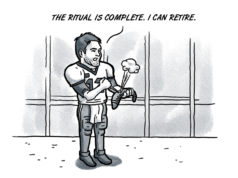One of the more routine tasks of being a public address announcer during my time at Langston University involved playing the national anthem at sporting events.
We would either use a YouTube version or have a student sing it live. Either way, it was typically the same every night — I would request that everyone stand up, remove their hats, put their hands on their hearts and look to the American flag. Then, the music would begin.
It was uncommon for fans to fail to remove their hats, but sometimes there would be an individual not paying attention who wouldn’t stand up. I remember one night in particular, however. On that night, a handful of fans were scattered throughout the gym who continued to wear their hats or failed to stand for the anthem.
Following the national anthem and the announcing of the starting lineups, a man came down to the half-court table and complained about the lack of respect shown for the flag by some of those attending the basketball game. I politely allowed the man to air out his complaints and offered my sympathies for his position. And then I went back to my duties of announcing the game.
National anthem receiving national attention
The issue of respect for the flag and the national anthem returned to my radar recently, first when U.S. gymnast Gabby Douglas did not put her hand on her heart during an Olympic rendition of the national anthem. She was criticized as un-American, and photos of her standing among fellow teammates showed the contrast of her actions.
The noise had finally quieted down when San Francisco 49ers quarterback Colin Kaepernick sat while the national anthem was being played. The reaction was again swift and relentless against Kaepernick, who said his decision was to bring attention to racial injustice and oppression of minorities in America.
Since the initial outrage from both events, Douglas apologized without offering much of an explanation. Kaepernick, on the other hand, offered no apologies and knelt during the national anthem at his next game.
Kaepernick has gained some supporters since his initial sit-down. Some have gone so far as to analyze the national anthem itself as a symbol of more than just a patriotic tune meant to boost our national spirit.
Americans are taking different sides regarding what is considered right or wrong when it comes to the national anthem. Tradition and falling in line with expectations demands that we do as I requested of the fans when I announced games at Langston — stand up, remove your hats, put your hand on your heart and look to the flag.
The problem is that some people take this societal mandate very lightly and some take it very strongly. Thus, when someone doesn’t “fall in line” with tradition, it can cause more than just a ruckus — it can turn into something the Hatfields and McCoys could be proud of.
The very freedoms our troops fought for
At Langston, my instructions to follow tradition came out of my mouth each game, but they were just words. Actions speak much louder than words, despite claims that the pen is mightier than the sword. The truth is that a fine line exists between respecting the flag and respectfully protesting because some of society’s expectations offer less wiggle room than others. Desecrating the flag or dishonoring it in any way always seem to land at the top of that list.
What we can’t lose sight of, however, is that the very freedoms our troops have fought for include those within the Bill of Rights, specifically the freedom of speech. While Douglas didn’t speak out verbally, all she did was express herself by choosing not to do something society expected her to do. In some countries, that may lead to exile or even death. In America, however, we voice our opposition and then move on.
With Kaepernick, his action was planned and intended to make a statement — a righteous statement at that. Again, the thing that makes our flag great is its representation of when our troops defended the rights of citizens to stand up against injustice and tyranny at an earlier time in our nation’s history.
While Kaepernick will never be confused with the patriots who spurred the American revolution, his actions were cut from the same cloth. He rebelled against what he and a great many people believe is a wrong that takes place daily in our country, and he has taken some criticism for his actions.
You also have the right to be upset
On the flip side, however, I am also fine with people being upset about Kaepernick’s protest. We all have a right to free speech, even if there is some hate attached to it.
So whichever side of this issue you sit on personally, please remember to focus on what is important: People fought hard for our freedoms, and we should be respectful to every aspect of what goes on around us — whether that is respecting the flag or treating people as equals.
We are Americans, and that is what makes our country great.





















